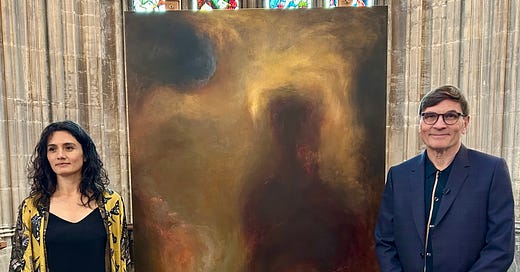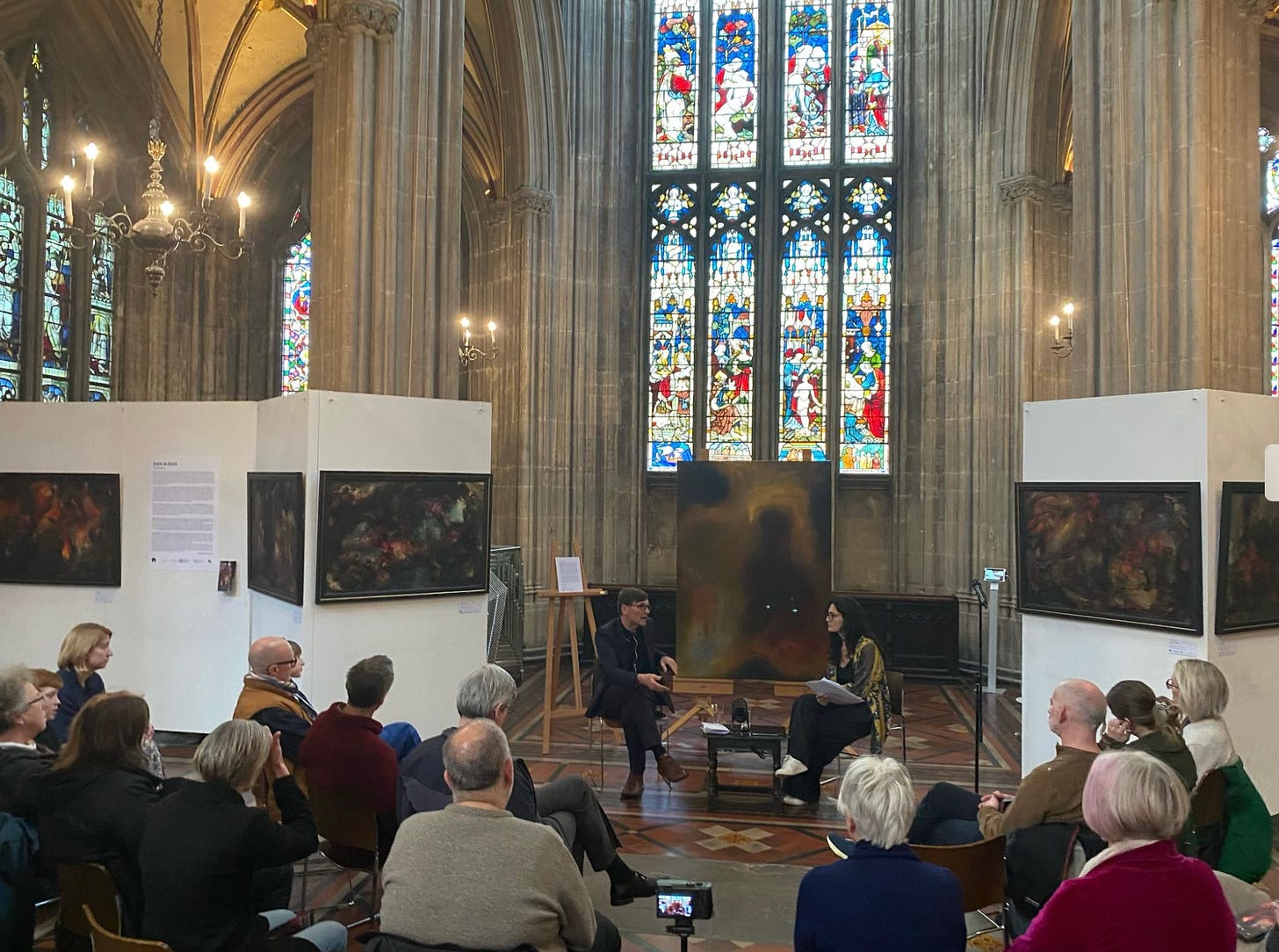The Soul of Ecological Thinking
Reflections on the soul of ecology and the ecology of the soul
Wilderness of Doubt is the name of the painting you see, that we commissioned at the Eco-Leadership Institute from Mexican born artist Chantal Meza. Chantal read my work and talked at length with me to interpret in her very powerful way something of what we at the Eco-Leadership Institute are about i.e. working in the space that is uncertain and precarious, yet beautiful, relational and loving.
The painting was exhibited at St Mary Redcliffe Church Bristol as part of the Eden Bleeds exhibition by Chantal. I was invited to give a short talk on the topic The Soul of Ecological thinking as part of this event, before being in conversation with Chantal and the audience. It was a very moving home-coming for me, as Bristol was where I was born and raised, and my family were present. The talk I gave is below.
The Soul of Ecological Thinking
Today I will briefly talk about the Soul of Ecology and its relationship to the Human Soul
Put it in the most simple terms, the soul of ecology, is a relational and a mutual soul. Without relationality there is nothing. Nothing makes itself, nothing exists without mutual relationships with others. Humans cannot live without interdependent relationships, we cannot digest food without micro-organisms in our guts, we cannot breath oxygen without forests and flora. We have mutuality baked into our lives. Without the scaffolding that nature, other people and technologies provide we are nothing. Today we live in a Precarious-Interdependent Age, the environmental precarity is beautifully captured by Chantal’s art in this Eden Bleeds exhibition.
The idea of Precarious-Interdependence lies at the heart of our work at the Eco-Leadership Institute. In recent years we have worked with senior leaders in global corporations, with faith leaders and with humanitarian leaders in Ukraine, Poland, Zimbabwe and Tanzania. Two things have become clear when working across such diverse sectors; firstly, they all experience the precarity, nothing feels stable. For some the precarity threatens lives, for others the precarity threatens livelihoods. Secondly, there is a great deal of disenchantment in the world today. Modernity has led us along a pathway promising greater civilization and prosperity, whilst in parallel, uncivilized colonialism, wars and conflicts, bio-diversity destruction and environmental catastrophe have been rampant. Precarity and disenchantment call for action. Our response at the Eco-Leadership Institute has been to take small steps to co-create ‘ecosystems of re-enchantment’. Applying science and political will to address the environmental crisis is one challenge, but the radical and sustainable solution will come from the re-enchantment of our souls.
If the ecological soul is found in mutual relationships, where is the human soul found?
The soul is traditionally imagined as being our deepest inner-self, a soul that transcends our bodies after death. Another idea of the human soul, is of an ecological soul, a relational and mutual soul that resides in us, between us, and in all things around us. When walking on the limestone pavements of the Burren, or in the forests of Poland, or on beaches on the west coast of Ireland, I experience the precarity and beauty of being connected to nature and magically my soul comes alive.
This ecological soul also becomes animated when we engage compassionately with other humans…. those living, dead and yet to be born. This perspective is taken by indigenous and first nations peoples; the past is honoured and the future is crystalised in the actions of the present; ‘we plan for our future children’. The soul is also animated when we relate to our non-humans companions, with animals and plants, in our gardens and parks. Our souls come alive, when in communion with the seen and the unseen world around us.
To experience our soulful ecology, is to expand our thinking and open our experience to become connected to the whole. This ecological soul can be hard to grasp for us moderns, so let me share a snippet of my personal soulful ecology, to bring the soul to life in the here and now. I have returned to Bristol for this event, the city where I was born and raised. My soul is entangled here, in places and people that are transcendent. My childhood soul was enchanted on Rodway common where I played with my brothers and friends, and we knew every inch of that lovely green space, climbing the trees, hiding in the bracken, and now my mother and fathers ashes rest on that land, their souls alive in me and our family. Our ancestors live within us, and my lost brothers Steven and Mark, and grandparents souls smile upon me. When I bake bread and make marmalade my mother’s soul shines, when I picking potatoes and peas in the garden with Albert and Lily; my gardening father and brother Marks souls are evoked. The genes, habits, expressions and souls of past family are expressed consciously and unconsciously in our living and evolving family ecosystems.
My first job was in Bedminster, at Robinsons paper bag factory where my soul was made resilient, fed by tough men and women working on the industrial machines. I trained as a nurse at Frenchay hospital, accompanying the sick and dying on their journeys, and experiencing the comradeship of the nursing community.
As a teenager and young adult, it was rugby, Rasta’s, riots and punks in this rebel city, that awakened the rebel soul that lives within me today. Later I moved north and my beautiful son Fynn animated my soul, as we travelled together to the Himalayas, China, Appleby Horsefair, sharing the experience of extraordinary natural beauty, and the hospitality of diverse peoples . When he died my heart was broken, but my soul was strong and Fynn’s soul and my soul are bound eternally together. Now I live in Galway on the very edge of Europe, and my soul is enchanted each day by wonderful Lily and Albert, where we cycle and walk by the sea enjoying the sunrises, picnicking together on Mutton Island with the cormorants and herons, and go wild camping on Inishmaan. Poland and Krakow have become part of my ecology, where I met my beautiful wife Agata, and we found ourselves as soul-mates, whilst wandering forests and market squares together. There is an ecology of soul companions here today who have journeyed with me, Lynn, Gareth, Thomas, Rosy, Chantal and Brad, and all of you, interconnected and interdependent with each other.
My soul comes to life in natures spirit places; by the sea, in forests deserts, mountains and also in holy places too, with people of faith. My soul is beckoned to monasteries and mosques, Krishna temples and Quaker meeting houses, and to art galleries and architectures which inspire me, and find myself today in this beautiful church.
Nature, art and people are mutually nourishing and make up the ecology of my soul.
To address the environmental emergency, requires a re-enchantment of our souls. It is not just a question of what to do, it is a question of how we live. Our collective task is to reconnect with our ecological souls, to bathe deeply in local landscapes, and to realise our interdependencies with each other. Perhaps then we can learn to live well in this precarious-interdependent world, and enjoy our mutuality with all living beings, and to become whole with the cosmos once again.






Beautiful writing, Simon. Thank you.